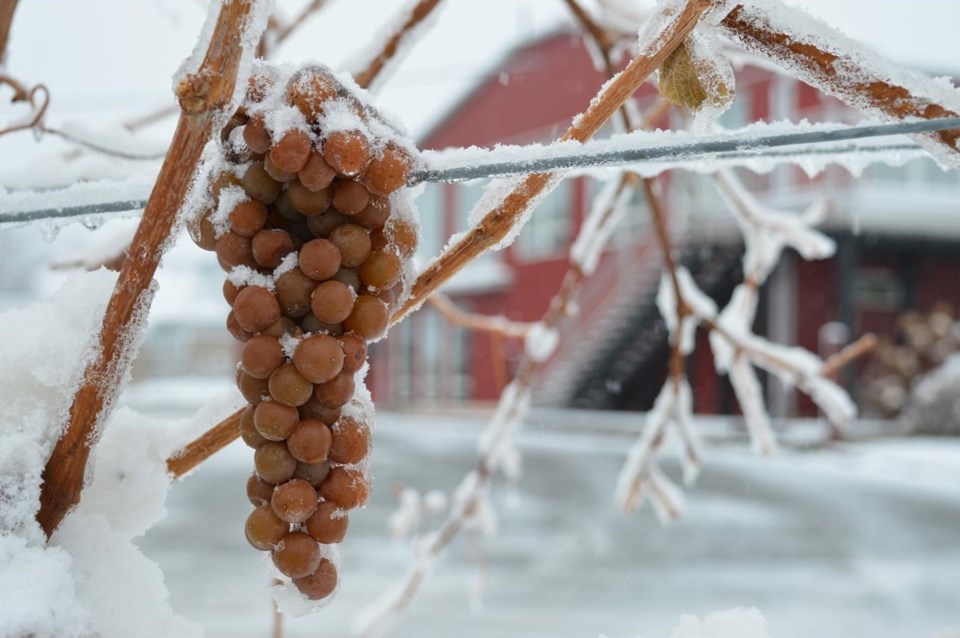It's been a tough season for icewine in Ontario.
Unpredictable and fluctuating winter weather, combined with a reduced vine crop due to a debilitating cold snap last year, has meant a smaller yield this season. And some producers have opted out of making the dessert wine altogether.
"It looks like there wasn't a lot of icewine made this year," Aaron Dobbin, president of the Wine Growers of Ontario, said in an interview.
"The volatility – that's what we're seeing right now as the biggest challenge with climate change."
Swings in temperature have made the icewine grape harvest more challenging in recent years, Dobbin said. Changing weather patterns also affect work done after harvest to prepare for the following year's icewine crop, he said.
"We are seeing cold snaps in April, in May," he said. "So when the buds start coming and then we get cold snaps after the buds have come, that's a big problem for our industry."
Many producers also have smaller crops to harvest from this year due to a severe drop in temperatures in January 2022 that killed a significant portion of vines, Dobbin said.
Pillitteri Estates Winery in Niagara-on-the-Lake, Ont., began this season with a "diminished crop" as a result of that cold snap, said Jamie Slingerland, director of viniculture at the winery.
The winery then had to delay its harvest as it waited for cold enough weather.
"This was a bad winter for icewine," said Slingerland. "We couldn't pick a good portion of our crop until the first week in February."
Grapes for icewine must be harvested in temperatures no warmer than -8 C, according to standards set by VQA Ontario, the province's wine regulator.
"(The grape harvest) normally is done early in the winter. We try never to do an icewine harvest in March," said Slingerland, noting that their icewine grapes are typically harvested in the first week and a half of January.
The longer a winery has to wait for the right temperatures to harvest, the higher the chances of losing grapes, he said.
Warmer bouts of weather later in the winter can cause grape varieties with thinner skins to dehydrate and begin to decompose on the vine, said Slingerland. Grapes can also be attractive to birds, he added.
"As you get toward February and if you get some warmer weather before that, you start to lose two per cent a day," he said. "There's almost nothing left ... of say, for instance, riesling or a cabernet franc grape by the 1st of February."
Poor weather and a deteriorating market in previous years played into Henry of Pelham Family Estate Winery's decision to not produce icewine this year, said president Dan Speck.
"We had a short crop due to some really cold weather in January of 2022," said Speck. "And so really, all of our fruit was directed towards still and sparkling wines and not towards icewines."
Speck said mild winters and deep cold snaps have caused issues in recent years, but he is nonetheless optimistic the industry will persist.
"Warming weather in Canada is more likely to lead to challenges in terms of quantity, not in terms of the ability to produce it at all," said Speck.
Reif Estate Winery in Niagara-on-the-Lake also opted to not produce any icewine for the 2022-23 season, the first time it has made such a decision since 1984.
"Reason No. 1 is basically the crop over on our farm was very low, so we didn't have many grapes available to make icewine," said president Klaus Reif.
"The winter of 2021 to '22, we had a very cold night and we lost many of our grapevines. So we had about a 40 per cent lower crop than in (previous) years."
Reif said they also opted not to produce icewine this season because of excess inventory left over from previous seasons, when the pandemic caused a severe drop in tourism from Asia, which drives a lot of Canadian icewine sales.
Reif believes wineries in Canada will continue to produce icewine in the short term, though he is unsure beyond that.
"In the wine industry ... the up-and-down temperatures, it's very, very harmful for us," he said. "For now, we're safe. But who knows what it's going to be in 50 years ... It's very hard to predict."
This report by The Canadian Press was first published March 10, 2023.
Jessica Smith, The Canadian Press



